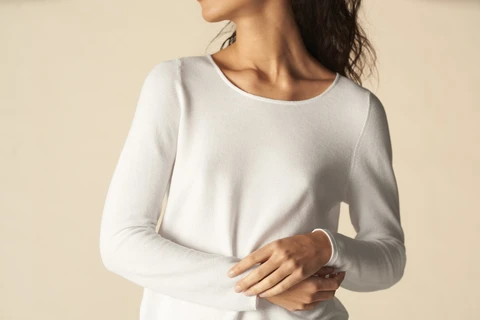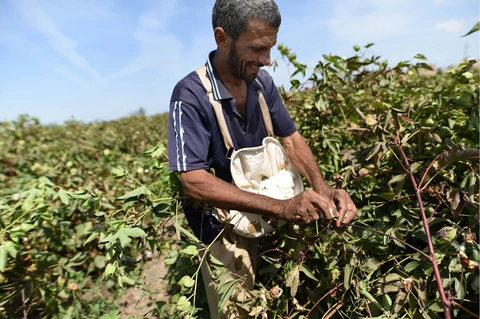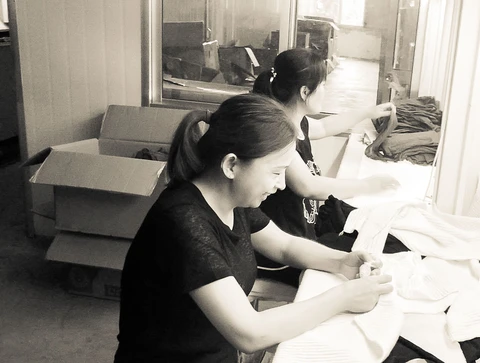#cottonforlife
Egypt’s rarest ELS (extra-long staple) cotton certified organic transforms the cotton value chain
Our partner in cotton for more than 22 years, Filmar, multiplies in authenticity and innovation in the production of the first high-end organic cotton (LS and ELS cotton (long staples, and extra- long staples) which represents 3% of world cotton production).
The finished product at ça va de soi is the one you may already know: NILO, a cotton that is as rare as it is ethical ...
NILO cotton is the first cross between the seeds of two exceptional cottons, Giza 45 and Giza 87, the most prized in the world for their long staples, their fine micron, and their rarity. The feeling of balm that this cotton generates on the skin gives it a year-round charm and pleasant use. We like to say these special collections provide comfort, well-being and self-confidence ...

By purchasing an item from this collection, you are participating in one of the most beautiful campaigns in the field of textiles: #cottonforlife, which strives for the 10 global goals towards sustainable development.
Cottonforlife is a campaign that aims to achieve these 10 goals in 5 years. We've been participating one collection at a time by producing this yarn since the campaign began in 2017.
Thank you, customers-consumers for requesting transparency and traceability in all stages of the production chain, in order to encourage all members of this chain (from the cotton farmer to the product sold in stores) to review our values, and transform them!
We must first ask each other this question which represents our ultimate choice:
Why certify this "organic" cotton when the Egyptian LS / ELS cotton (long, and extra-long silks) already requires special attention to the environment?
It is strictly impossible to produce cotton with such rare seeds as Giza45 and Giza87 cotton without a mastered technique that respects the earth year after year. Namely that the Egyptian cotton varieties Giza45 and Giza 87 are auctioned at prices comparable to cashmere... Without harvesting these cottons by hand, with artisan producers who have practiced fallow in the rich Nile delta, and techniques of mastered spinning mills (virtually no waste of raw material, and unmatched performance, beauty luster) in Italy for decades we could not knit such durable products.
Egyptian cotton staple length gives it superior characteristics with respect to strength, feel, color absorption and durability. The longer lengths directly contribute to the uniformity, strength and luster of yarns, making them softer and more durable. The excellent quality, makes Egyptian Extra Long Staple (ELS) and Long Staple (LS) cotton particularly well suited for luxury products. ça va de soi only uses ELS fibers (> 35mm), which represent 1% of world cotton production.

The answer is simple, after having made the right choice: to produce only cotton knitwear with ELS fibers, all that remains is to bind and collaborate in terms of values and meaning in the world we live in. This is why we have reserved a quantity of this Grand Cru since its launch in 2017, that is 400-500 kilos per year of this extremely rare cotton yarn which is now in the hands of a few big houses. NILO as part of #cottonforlife is worthy of a noble campaign both on ecological and human terms. Here is how the global sustainability goals will be achieved, thanks to all the players: the farmer, the industrialist spinner, the designers, the clothing manufacturers and producers, and the consumers:

Cotton
Cottonforlife grows in Egypt the finest cottons in the world without use of pesticides or other toxic Cottonforlife grows in Egypt the best cottons in the world without using pesticides or other toxic chemicals and following organic procedures that allow GOTS certification. Cottonforlife has launched, for the first time in the history of Egyptian cotton, the organic cultivation of the Giza 45 variety, thanks to the efforts of Egyptian farmers who have been committed for generations to this ancient and extraordinary raw material. Cottonforlife has established long-term and inclusive partnerships with stakeholders in the cotton value chain for the cultivation of Giza 45, 87 and 86 in the Egyptian regions of Damietta and Behera. Cottonforlife successfully promotes the best Egyptian cottons in the global textile and fashion markets. The cotton yarns produced under Cottonforlife are highly sought after by customers not only because they are the result of exceptional cotton seed varieties, Giza 45 and Giza 87, but also because they are organic, ethical, transparent and environmentally friendly.

Industry
Cottonforlife promotes and supports new models of "sustainable business" to promote a socially inclusive and highly innovative industry capable of designing and creating products to optimize social and environmental impact. Cottonforlife promotes the creation, at Filmar Nile Textile in Borg el Arab, of an Egyptian industrial factory where the transformation of cotton in rows is based on eco-compatible processes that respect the well-being of people and social criteria. Filmar Nile Textile has voluntarily engaged in Green Peace's DETOX campaign, to remove 11 classes of chemicals from processes and products, in order to reduce the environmental impact of cotton throughout the life cycle.

Education
Cottonforlife encourages training and employability of young people in the textile industry, contributing to social inclusiveness. Through an innovative multi-actor partnership and in coordination with the Egyptian Ministries of Education, Agriculture and Industry. Cottonforlife has set up training courses in the fields of organic farming, the textile industry and eco-design. It promotes sustainable fashion to young people and organizes information and awareness campaigns for the adoption of responsible consumption patterns.

Circular economy
Rediscovering: creating links, sharing ideas and promoting sustainable solutions to inspire new generations of fashion designers. Cottonforlife encourages the creative use of leftover textiles to protect the environment and improve circular production models. The Rediscovery pilot project trains young emerging fashion designers on eco-design, innovation and sustainability in the fashion industry. Through a combination of hands-on workshops and theory-based presentations, participants learn how project outlines and sustainability can become a creative starting point: focusing on the very real need to preserve and promote core values such as protecting our environment and promoting collaboration and social innovation. Since 2019, ça va de soi has started an upcycling pilot project that leaves no damaged knitwear out. We produce, reusable decorations, hair scrunchies, reusable bags to contribute to the circular economy. Thanks to the artist and service manager çavabain Karolane.


Research and Innovation
Cottonforlife collaborates with research institutes and universities such as the Cotton Research Institute and the Central Laboratory of Organic Agriculture in Cairo to promote scientific research in the field of cotton and to assist farmers in cotton cultivation. organic. Cottonforlife promotes research for the reduction and elimination of harmful chemicals in processes and products, in line with Green Peace's DETOX campaign. In order to achieve this important goal, Cottonforlife has established partnerships with producers of chemicals and suppliers of raw materials and services. Our workshop in North China is also certified against the Oeko-Tex 100 standard, which rigorously tests all harmful substances in the production process and its impact on the environment to the product and its effects on human health.


Our workshop in Jinan, China



Cooperation and inclusion
Cottonforlife has sparked a virtuous circle of collaboration between countries and international stakeholders to support the sustainability of the cotton value chain. An important partnership that includes the agricultural and textile private sector, public institutions, designers, banks, schools and universities, international organizations, foundations and civil society, the consumer. Together, we work to promote new business models with the ultimate goal of achieving high quality, traceable, transparent and socially inclusive products capable of creating shared social and financial returns throughout the cotton value chain. Our participation in this beautiful chain is to respect and pay the price at its fair value so that each member (from the farmer, to the worker, to the seller) can offer a sustainable and beautiful product with the least hidden costs related to Marketing or Administration as possible. A variety of timeless styles that offers choice and freedom to the wearer. Never overdo, or overproduce, and do what you need to d: This is what represents for us respect and improvement of all that is at stake in the chain.
We as consumers have the power to transform the industry through our choice:
That of consuming less, but better.
And to choose products that are linked in this beautiful collaboration throughout the value chain.
Discover the complete Nilo collection collection here




